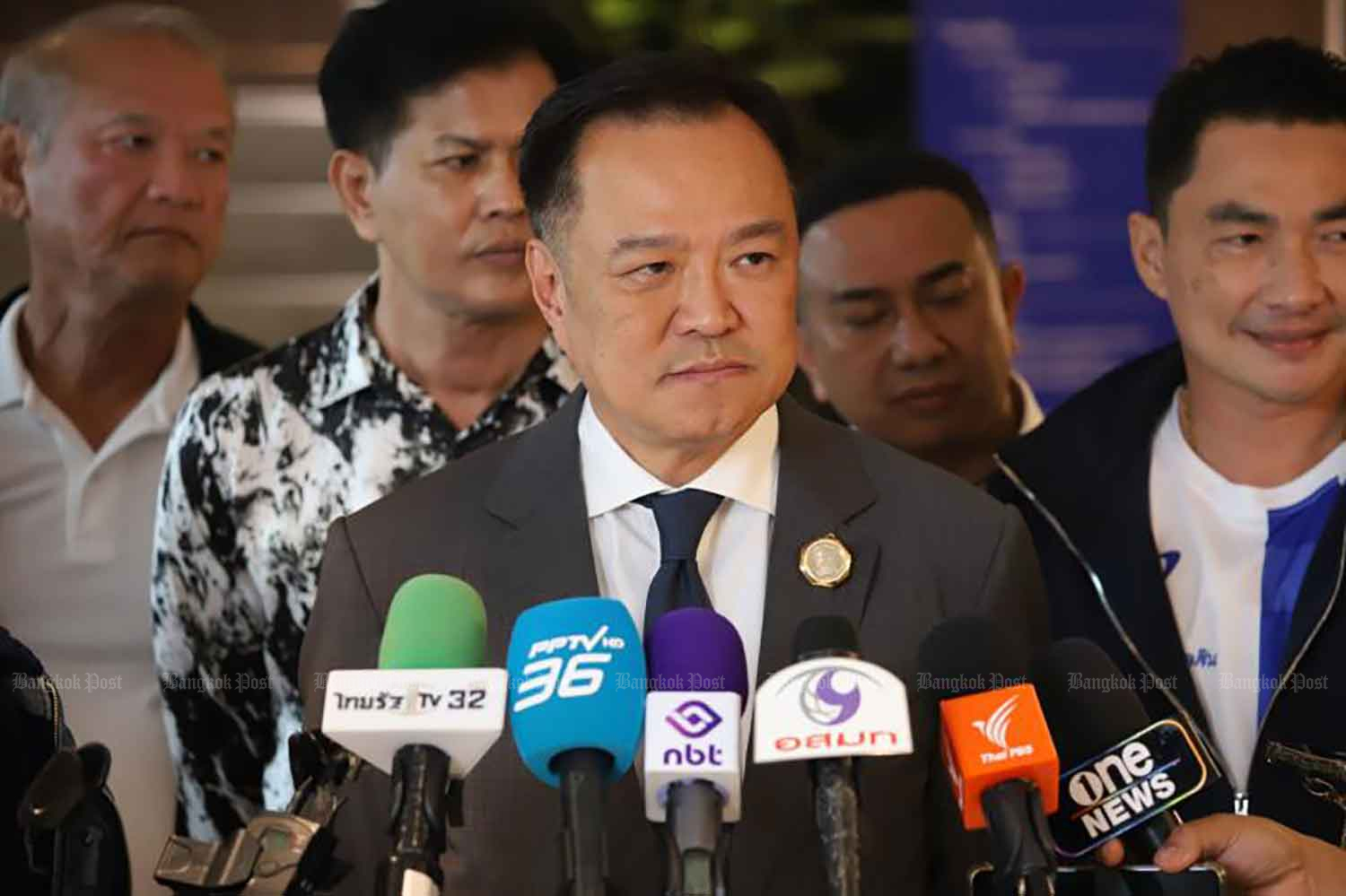Anutin Charnvirakul, the leader of Thailand’s Bhumjaithai Party (BJT), has openly dismissed speculation that he is positioning himself to become prime minister. Speaking after the party’s weekly MPs’ meeting at the Bangkok headquarters, he made clear that there is no “war room” being organized to confront the upcoming Constitutional Court ruling tied to the audio clip controversy involving suspended Prime Minister Paetongtarn Shinawatra and Cambodian Senate President Hun Sen. His quip—“There is only a love room”—was delivered in a light-hearted tone aimed at defusing tension and reframing the conversation around collaboration rather than confrontation. At the same time, Anutin addressed renewed attention on social media after he posted and then deleted a photo showing him dining with energy and telecoms magnate Sarath Ratanavadi, insisting the moment was a routine blending of longstanding friendship and casual social interaction, not a political move. He also reiterated that he has no plans to become premier, brushing aside questions about his own future leadership role in Thai politics.
Context: Bhumjaithai Party, Anutin Charnvirakul, and the Thai Political Landscape
The Bhumjaithai Party has played a significant and increasingly visible role in Thai political dynamics, positioning itself as a pragmatic partner capable of influencing coalition-building and policy direction. Under Anutin Charnvirakul’s leadership, the party has cultivated a reputation for balancing regional interests with national concerns, advocating for governance that prioritizes local development, security, and social welfare programs. This positioning comes at a time when Thai political factions are navigating a landscape shaped by constitutional considerations, shifting alliances, and the perennial question of leadership succession.
Anutin’s leadership style—decisive when presenting policy priorities, yet careful in managing media narratives—emphasizes a strategy of steady messaging rather than dramatic spectral shifts in power. The weekly MPs’ meeting at the party’s Bangkok office is a focal point for aligning parliamentary tactics with the party’s broader public messaging. In this context, the party’s response to questions about a potential “war room” is telling. It signals a preference for controlled, calm communications rather than aggressive, operation-like undertakings that could be interpreted as preparing for a confrontation with opponents or critics. This approach aligns with a broader trend in Thai politics where leadership teams seek to project stability and reliability, particularly in moments of legal or constitutional scrutiny.
The audio clip controversy around Paetongtarn Shinawatra—a figure who has been at the center of political discourse and legal scrutiny—adds another layer of complexity to the scene. While Paetongtarn’s status as a suspended prime minister has placed her at the heart of court deliberations and public debate, the Constitutional Court’s ruling—scheduled for Friday—becomes a focal point for political actors beyond the immediate case. Anutin’s emphasis on avoiding a “war room” mirrors a strategic philosophy that seeks to reduce sensationalism and position BJT as a responsible, orderly participant in the rule of law. Observers note that this stance may be designed to bolster public confidence in the party’s ability to navigate delicate constitutional matters without inflaming factional tensions.
The broader Thai political landscape is characterized by a web of alliances, rivalries, and constitutional considerations that can shift rapidly in response to court decisions, media narratives, and public sentiment. In this milieu, Anutin’s explicit denial of any plan to pursue the premiership serves multiple functions. It defuses potential aspirational narratives that could complicate coalition dynamics and signals a commitment to focus on day-to-day governance and policy implementation rather than personal power consolidation. By maintaining a posture that downplays leadership ambitions, Anutin may be aiming to preserve flexibility for future political maneuvers while reassuring voters and party members that the BJT will not engage in destabilizing shifts. The interplay between personal credibility, party discipline, and the optics of leadership in Thai politics makes such statements particularly consequential for both supporters and critics.
The Legal and Political Stakes
Within the context of the Constitutional Court ruling, the Thai political system faces a moment of heightened scrutiny of legal processes and their implications for governance. The audio clip controversy has ignited debates about executive accountability, media ethics, and the boundaries of political discourse. For Anutin and the BJT, the court’s decision could influence how the party positions itself in ongoing coalition negotiations and how it frames its stance on issues such as governance, reform, and public welfare. The timing of the ruling—framed as a Friday proceeding—adds a rhythm to political communication, adding urgency to statements released before and after the decision. In preparing for this moment, the BJT’s messaging strategy appears to favor measured, transparent communication that emphasizes legality and procedural propriety, rather than sensationalism or provocative rhetoric. The ultimate aim is to maintain public trust and demonstrate a steady commitment to constitutional processes, regardless of the ruling’s outcome.
The War Room Question: A Symbolic Jest to Frame the Debate
During the press interaction, the question about establishing a “war room” to navigate the upcoming court decision became a focal point for interpreting the party’s approach to crisis management and communications. Anutin’s response was precise and delivered in a manner intended to deflate anxiety and redirect attention toward productive, constructive dialogue. By stating that there is no war room, and by reframing the concept as a “love room,” the party leader introduced a humanizing, non-confrontational metaphor that undermines the idea of escalation. This choice of words serves multiple strategic purposes: it reduces perceived aggression, strengthens the image of cooperative governance, and signals a readiness to engage with policy issues in a calm, transparent manner.
In political communication, such framing can influence public perception by shaping the narrative arc around a sensitive issue. The “war room” metaphor, often associated with high-stakes opposition research and rapid response teams, implies a camped and adversarial posture. Replacing it with a “love room”—a term that connotes diplomacy, reconciliation, and amicable dialogue—sends a counter-message: that the party seeks to manage the situation through dialogue, not confrontation. This subtle shift in language can have real effects on media framing, opposition responses, and public expectations about how crises will be handled. For supporters, the “love room” notion may reinforce confidence in the party’s capacity for stable governance; for opponents, it can be read as a sign of cautious or conservative tactics that prioritize consent and consensus over assertive maneuvering.
Practical Implications of Messaging Choice
The practical implications of choosing a non-confrontational frame in Thailand’s political environment are nuanced. In a political culture where coalition-building is essential for governing, signaling readiness to collaborate across party lines can facilitate smoother negotiations and policy passage. On the other hand, some critics may interpret the retort as a tactic to dampen scrutiny rather than a genuine commitment to accountability. This dynamic underscores the importance of credible, verifiable actions to accompany verbal reassurances. In the days ahead, watchers will look for concrete steps the BJT takes to demonstrate its governance readiness—committee oversight procedures, policy proposals, and transparent communication with the public—so that the “love room” metaphor translates into measurable, positive outcomes for constituents. The success of this approach will depend on whether the party can sustain a narrative of steady leadership under legal scrutiny while avoiding the perception that it is retreating from a robust political stance.
The Constitutional Court Controversy and Friday’s Ruling: What It Means for the Parties
The Constitutional Court’s ruling, set for Friday, centers on matters arising from the audio clip controversy that touches on the broader question of executive legitimacy and public confidence in leadership. While the specifics of the ruling are not fully disclosed in the public discourse, the anticipation surrounding the case has already influenced political dialogue and party strategy. For the BJT, the imminent decision introduces a critical moment to demonstrate adherence to constitutional norms and to articulate a policy-oriented vision that resonates with voters amid legal scrutiny. The party’s official statements suggest an emphasis on governance stability and procedural integrity, aiming to reassure supporters that the party remains committed to lawful governance and the rule of law.
From a broader perspective, the court ruling can shape the strategic calculus of all major players in Thai politics, including opposition parties and coalition partners. If the decision reinforces the legitimacy of the current constitutional framework, stakeholders may feel confident in pursuing long-term policy agendas and coalition agreements. Conversely, if the ruling introduces unexpected political shifts, parties might need to recalibrate their messaging, re-align alliances, and reassess their capacity to navigate a potentially more tumultuous political environment. In such a dynamic, the ability to communicate clearly, demonstrate accountability, and maintain public trust becomes a decisive factor for success. Anutin’s emphasis on calm, legalistic processes aligns with a strategy aimed at sustaining legitimacy and building credible governance narratives in the face of heightened scrutiny.
Reassurance Through Responsible Governance
A central thread in the discourse surrounding Friday’s ruling is the drive to reassure the public that governance will proceed with responsibility and transparency. The BJT’s approach—eschewing sensationalism and avoiding a confrontational “war room” stance—can be read as an effort to foreground policy discussion and leadership quality over partisan theatrics. For voters and civil society observers, the clarity of this message matters: it signals that the party values due process and wants to maintain stable, predictable governance during a period of uncertain political weather. By focusing on constitutional compliance, legal norms, and a measured public communications strategy, Anutin and the BJT can position themselves as reliable stewards of national governance, which may influence electoral calculations, policy priority setting, and coalition considerations in the months ahead.
The Sarath Ratanavadi Photo: Public Attention, Personal Ties, and Media Narratives
Attention on social media surged after Anutin posted and subsequently deleted a photo of himself dining with Sarath Ratanavadi, a prominent energy and telecoms magnate described as a billionaire. The incident sparked speculation about possible political implications, but Anutin clarified that the image reflected a longstanding personal friendship rather than any political engagement or partnership. He explained that he and Sarath have known each other since childhood, attended the same schools and universities, and even began playing golf together, highlighting the long history of their acquaintance. He emphasized that the interaction was not part of a political scheme and urged the public to see it as a routine personal matter rather than an indicator of policy alignment or political intent.
The episode illustrates how social media can amplify seemingly minor personal interactions into political narratives that require careful management. In today’s information environment, everyday activities—such as sharing a meal with a longtime friend—can be reinterpreted through the lens of ongoing political discourse. The rapid cycle of posting, then deleting, can fuel a loop of speculation, questions about hidden agendas, and theories about power dynamics. Anutin’s explanation seeks to restore the boundary between personal life and public service, underscoring that friendships across business and political spheres do not necessarily translate into coordinated political actions. This distinction is important for maintaining public trust and ensuring that the lines between private relationships and public responsibilities remain clear.
The Public Perception Challenge
Public perception is heavily influenced by how quickly and convincingly officials can separate personal affiliations from policy considerations. The Sarath Ratanavadi situation tests the ability of political figures to manage the optics of social media in a way that reinforces transparency and integrity. For supporters, the clarification may reinforce confidence that relationships do not distort political judgments. For critics, the episode might fuel skepticism about the separation between business interests and political decision-making. The key for Anutin and the BJT is to demonstrate consistent behavior that aligns with the stated principle: personal associations should not be perceived as a shortcut to influence public policy. This requires ongoing, visible adherence to ethical standards, rigorous disclosure where appropriate, and a consistently clear public communications strategy that prioritizes accountability and openness.
The Role of Personal Relationships in Political Narratives
The broader conversation about personal relationships in politics is not new, but it remains highly salient in contemporary Thai politics. Leaders are continually evaluated not only on their policy platforms but also on the networks they cultivate and the integrity with which they handle potential conflicts of interest. While friendships spanning decades and across sectors can be a testament to character and shared history, they also carry the risk of misinterpretation if not managed with transparency. In this case, Anutin’s insistence that the interaction was purely personal serves as a reminder of the importance of separating non-political relationships from political influence. For observers, the episode underscores the need for clear, consistent, and verifiable communication about interactions with business leaders and other influential figures. It also highlights the role that media narratives play in shaping perceptions about the intersections between business, media, and politics.
The Premiership Question: Anutin’s Denial and Implications for Leadership Speculation
In responding to questions about whether he is preparing to become the next prime minister, Anutin offered a straightforward reply: no. The directness of this denial serves to manage expectations and prevent overt leadership speculation from destabilizing the party’s internal dynamics or public messaging. It signals a focus on current responsibilities and policy work rather than personal power ambitions. Yet the repetition of the question in media cycles indicates that speculation about leadership remains a persistent feature of Thai political reporting, driven by the country’s complex coalition dependencies and the frequent turnover in top leadership roles.
From a strategic standpoint, such a denial can serve multiple purposes. It reinforces the notion that Anutin intends to contribute to governance in a capacity aligned with the party’s existing leadership structure. It also helps to avert potential destabilization within the coalition, where other partners may be weighing leadership options and negotiating for influence. The media’s appetite for leadership narratives can be intense, and officials often need to respond with concise, unambiguous statements to prevent misinterpretation. Anutin’s “no” is thus part of a broader strategy to maintain stability, communicate competence, and avoid creating a vacuum or power contest that could disrupt policy advancement or coalition coherence.
Leadership Ambition and Future Scenarios
While the immediate message is a refusal of leadership intentions, observers may still speculate about the longer-term trajectory of Anutin’s political career. Thai political dynamics are characterized by fluid coalitions, shifting alliances, and strategic calculations about who is best suited to lead in different eras. Anutin’s emphasis on present-focused governance and legal process alignment could be interpreted as a tactical choice to preserve room for future maneuvering, should the political environment change. For party members and supporters, this framing can be reassuring, reinforcing the idea that leadership decisions are grounded in pragmatic considerations rather than opportunistic gambits. For opponents, it may suggest that the door remains open for future leadership discussions, albeit within a controlled and disciplined approach that prioritizes policy and governance outcomes over personal power struggles.
Social Media Attention, Public Discourse, and Messaging Strategy
The recent social media attention around Anutin’s dining photo illustrates how online platforms can magnify ordinary moments into political narratives. In a political environment where every public gesture may be read for signals about alliances, the ability to control the narrative becomes a critical skill. Anutin’s decision to explain the context of the photo—emphasizing the long-standing friendship and non-political nature of the meeting—serves to preserve the integrity of his public persona and reinforce a message of transparency. It also underscores the need for careful social media governance: posts can elicit rapid speculation, which can become a factor in shaping public opinion. The party’s response to such incidents will likely involve proactive communication that clarifies intentions, provides context for personal interactions, and reinforces a consistent, policy-focused public image.
A Strategy for Managing Digital Narratives
Given the prominence of digital discourse in contemporary politics, the BJT could benefit from a structured approach to digital communications. This could include pre-emptive explanations for high-profile interactions, transparent disclosures when applicable, and a clear distinction between personal life and public responsibilities. Such a strategy would help to mitigate misinterpretations, reduce the likelihood of misinformation, and maintain trust among constituents. It may also create a model for other parties navigating similar situations, contributing to a more disciplined and credible political information ecosystem.
Implications for BJT Strategy and Thai Political Dynamics
Anutin’s public statements and the accompanying media coverage have the potential to shape the BJT’s strategic posture as Thai politics continues to evolve. By emphasizing a calm, legally grounded approach to sensitive issues, the party signals its intent to be a stabilizing force within a volatile parliamentary landscape. This posture may influence the party’s policy emphasis, its approach to coalition-building, and its outreach to voters who prioritize governance quality, rule of law, and pragmatic problem-solving. Stakeholders—including party members, supporters, opponents, and civil society groups—will be watching not only for what is said in press conferences but for the concrete actions that follow these statements, such as policy proposals, legislative initiatives, and formal governance processes.
Policy and Governance Priorities
In the wake of legal and constitutional scrutiny, the BJT’s policy agenda could become a central feature of its public messaging. The party’s emphasis on local development, security, and social welfare programs—areas often associated with Anutin’s leadership profile—may receive renewed emphasis as signals of continuity and responsible governance. The effectiveness of this messaging will depend on the party’s ability to translate words into measurable outcomes, including budget allocations, program implementation, and accountability mechanisms. The public will likely evaluate the party based on tangible results, and the leadership’s credibility will hinge on a combination of transparent communication, consistent policy positions, and demonstrated governance competence.
Broader Thai Political Landscape: Coalition Dynamics and Leadership Speculation
The events surrounding Anutin’s statements intersect with broader questions about coalition dynamics and leadership trajectories in Thailand. As parties navigate coalition agreements, negotiations over portfolios, and policy compromises, clear and steady messages can help reduce uncertainty and stabilize the process. The interplay between legal rulings, media narratives, and party strategy creates a complex environment in which leadership speculation remains a recurring theme. The BJT’s approach, which emphasizes calm, legal compliance, and personal integrity in communications, contributes to shaping how political actors present themselves to the public and how they anticipate the reactions of other stakeholders.
Coalition Stability and Policy Harmonization
Maintaining coalition stability requires careful balancing of competing interests and a shared commitment to policy goals. The BJT’s messaging, framed around governance and constitutional processes, can support a cohesive approach to policy development and parliamentary negotiation. The ability to articulate shared priorities, coordinate across party lines, and demonstrate legitimacy in legal matters will influence the coalition’s capacity to advance its agenda. In this context, Anutin’s public stance on leadership ambitions and crisis management may be interpreted as a tactical contribution to coalition resilience, fostering an environment where collaboration is prioritized over personal power contests.
Historical Perspective: Public Reactions and Narrative Shaping
Over time, Thai political discourse has shown that public reactions to leadership questions and high-profile interactions can significantly shape political narratives. Statements that emphasize legality, transparency, and measured responses tend to reinforce trust in institutions. Conversely, speculative coverage and sensational headlines can intensify polarization and erode confidence in governance. The balance between transparency and strategic messaging remains a critical factor in how narratives develop around leadership figures and political parties. Observers will likely assess the impact of Anutin’s remarks by examining subsequent communications, policy advances, and the public’s reception of the party’s approach to constitutional matters and crisis management.
Conclusion
The Tuesday remarks by Anutin Charnvirakul, the head of the Bhumjaithai Party, crystallize a deliberate effort to shape the narrative around leadership, governance, and constitutional processes in Thailand. By denying any plan to assume the premiership, dismissing the idea of a “war room” in favor of a “love room,” and clarifying the personal nature of a dining photo with Sarath Ratanavadi, Anutin presents a composed, governance-focused image designed to reassure supporters and observers amid a tumultuous political moment. The upcoming Constitutional Court ruling on the audio clip controversy involving Paetongtarn Shinawatra and Hun Sen adds urgency to these communications, with the potential to influence coalition dynamics, policy priorities, and public trust in the rule of law.
The broader implications for the BJT center on stability, credible governance, and clear, transparent messaging. As Thai politics continues to evolve, the party’s ability to translate these statements into concrete policy actions, maintain coalition harmony, and demonstrate accountability will be crucial. Anutin’s approach—anchored in pragmatism, legal process, and measured public discourse—may help set a standard for how political leaders respond to sensitive legal inquiries while navigating the complex interplay of media narratives, public perception, and institutional legitimacy. The coming days and weeks will reveal how these strategic choices shape the party’s trajectory, influence public confidence, and influence the broader contours of leadership competition in Thailand.



